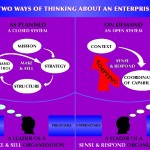 Managing complexity is an increasingly important trait in the modern world, and multiple studies have highlighted the importance of an adaptable and agile workforce (and processes), to allow organizations to become the sense and respond types required to thrive in such a fast moving environment.
Managing complexity is an increasingly important trait in the modern world, and multiple studies have highlighted the importance of an adaptable and agile workforce (and processes), to allow organizations to become the sense and respond types required to thrive in such a fast moving environment.
In an organizational context, that message has been trotted out for some time now, but the same is equally applicable to ourselves at an individual level. It’s a message PwC highlighted in a recent piece of work exploring the role of adaptability in the management of talent. The work highlights two core elements of adaptability, one from the employers perspective, and one from the employees.
On the employers side, they suggest that talent is viewed in a different way, especially when looking for sources of talent. We’ve seen for instance with numerous open innovation projects, and indeed from MOOC classes, that highly talented people often reside in very unusual quarters. Having the right mindset is the first step in overcoming this hurdle, and it’s a topic that I’ve written on previously. Truly being a sense and respond organization requires you to be able to apply the talent at your disposal (wherever it may reside) as quickly and productively as possible.
From an individuals perspective, the report highlights the importance of not only accepting rapid change, but truly embracing it. This involves a constant refreshing of skills, but also of course a constant re-application of those skills in new and innovative ways and fields. I’ve written before about the importance of loving what you do, because without that passion, it’s unlikely that you’ll invest the time and energy in updating your skills, making connections and generally investing in yourself.
A new report from the Institute for Corporate Productivity has highlighted six strategies organizations are deploying to create the kind of flexible and adaptive culture highlighted above. The report suggests that organizations that utilize these strategies are over 6 times more likely to respond successfully to changing circumstances than their peers.
- Constantly scan your environment – I wrote recently about the importance of being able to spot trends in your industry, and this is central to successful scanning of your environment.
- Decentralize to encourage information flow – Central to the sense part of sense and respond is ensuring that information from the fringes makes its way to decision makers within your organization.
- Make management of change a core competency – It’s well known that the majority of change processes fail to deliver results, so the report suggests enhancing your change management skills.
- Make learning a continuous process – I’ve written previously about the need to love what you do in order to invest the time and energy required to keep on top of changes in your field. Magnify this across your organization and you have a learning culture.
- Open up decision making – Having multiple layers of hierarchy between those with information and those that can act upon that information is not the way to become adaptive. Empowering those with the information to make decisions is.
- Hire for values – Being comfortable in a fast changing environment is often a matter of values, which is something the best organizations look for in the interview process.
The strategies align nicely with many of the things I talk about in The 8 Step Guide to Building a Social Workplace, in which I contend that building such a sense and respond organization requires a systemic approach, much along the lines outlined by i4cp.
How many of these organizational behaviours does your own company exhibit?
Sounds fairly sensible stuff. Thanks for sharing Adi.